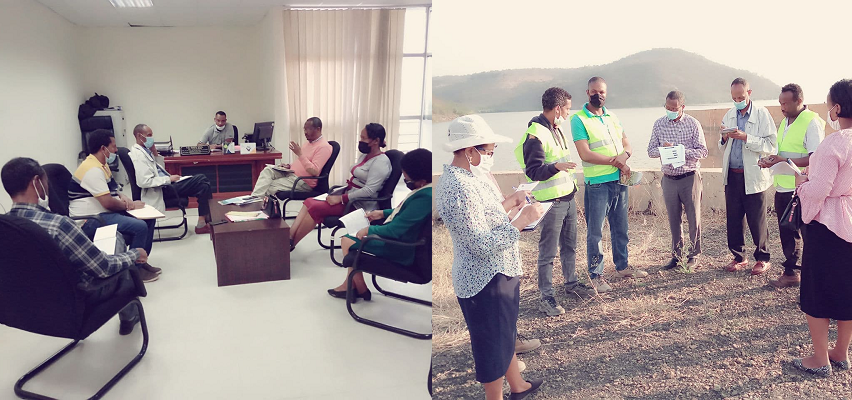The Committee Stressed Gidabo Irrigation Development Should not Lose its Purpose

January 19, 2021(HOPR):- During a recent field visit to Gidabo Irrigation Development, the House of Peoples' Representatives Standing Committee on Natural Resources, Irrigation and Energy said the project should not be lost to private investors as it should be used to create jobs for the local community and educated youth.
The Standing Committee noted that the Gidabo Irrigation Development Project, located on the border of Oromia and Sidama states, is planned to develop more than 13,000 hectares of land. In Oromia State, the main canal of the project is 96 percent complete. On the other hand, the Sidama regional government has confirmed that 34 percent of the project is under construction.
During the field visit, the members noted that land has been provided for the irrigation of the educated Oromia youth and that a complete infrastructure has been set up for the local community. The Oromia Regional State has started irrigation development on 350 hectares of land with a plan to develop 8,000 hectares of land.
According to sources, the Sidama regional government planned to develop 5,000 hectares of irrigation project. However, the committee found that it had not done enough to involve local farmers or recruit educated youth, and that its cooperation and support in the construction of the project was low.
After completing the field observation of the irrigation project, the group met with Sidama regional government leaders. Adviser to the President, Tesema Dima, said the project has not been given due attention in the past few months. He further promised that the region will provide the necessary support to the project contractors.
Loka Abaya Woreda Administrator, Zegeye Koisa, on his part, said the construction of the project was unfair and discriminatory. He recalled the construction of the project in Sidama region was delayed and the construction of infrastructure for the community was not considered.
Alemayehu Bekele, Water and Infrastructure Manager with the Ethiopian Construction Works Corporation, on his part said there is no discrimination in the construction of the irrigation project. He said the support and supervision of the Oromia Regional State has been strengthened, while the support and cooperation from the Sidama Regional State has been limited. However, the construction of the entire irrigation project will be finalized by July 07, 2021. He added that efforts are underway to complete it.
Member of the Standing Committee and the team's coordinator, Honorable Setegne Addisu, said the construction of the irrigation project, which has been delayed for many years now planned to be completed by the end of this budget year, the construction is being carried out by local engineers and the security sector is focusing on the construction work raised as strong points.
On the other hand, the lack of attention on the part of the Sidama region to benefit the local farmers and educated youths from the irrigation project, the lack of regional government participation in the construction process and the transfer of irrigated land to private investors are some of the issues raised to be corrected.
Related News: During a field inspection of clean drinking water in Dilla, the Standing Committee noted that the city was experiencing serious water shortages. The Committee found that 40 percent of the town's water supply was wasted since the town's water lines are old and damaged.
According to the town's residents, water is inaccessible to high-lying neighborhoods, and in parts of the town where water is said to be accessible, it will be out of reach for more than 15 days.
Dilla City Administration Water Service Manager, Fisseha Udo, lamented that the project, which is being built with the support of the Water Fund, has been delayed for 10 years. He said that although the construction of four deep wells has been completed, it has not been able to solve the problem in terms of population. According to Fisseha, the water coverage of the town is only 16 percent.
The Standing Committee, for their part, urged the existing authorities and the town administration to work together to solve the water crisis in Dilla town in a sustainable manner.
By Yared Eshetu
Copyright 2020 - All rights reserved. House of Peoples' Representatives
